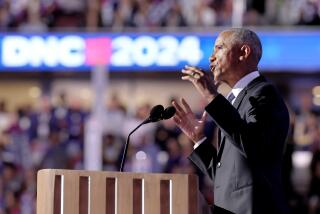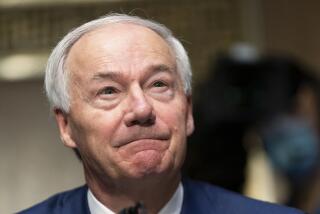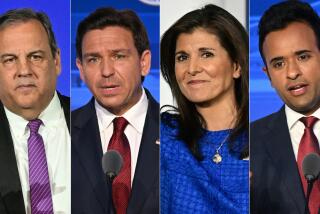Front-Runner Status Chills a Friendly Rivalry : Democrats: Campaign strains genial relations between Tsongas and Clinton. Their reactions may give clues to character of the two men.
- Share via
WASHINGTON — “We’re good friends,” former Massachusetts Sen. Paul E. Tsongas said recently of Arkansas Gov. Bill Clinton, his chief rival in the Democratic presidential race. But that friendship, Tsongas added, “will now be tested.”
Indeed, with the campaign increasingly focused on New Hampshire’s two top finishers, the once-warm relations between them already have begun to chill.
On Thursday, a top Clinton aide was quoted as calling Tsongas a “son of a bitch.”
For their part, top Tsongas aides have accused Clinton of conspiring to deprive Tsongas of a place on the ballot in New York’s April 7 primary. Clinton supporters have challenged the validity of Tsongas’ ballot petitions under New York’s highly technical election laws.
Although each candidate remains wary of attacking the other directly, both have issued warnings about going on the offensive if one of them strikes first.
The two candidates agree on many issues--including several on which they depart from their party’s orthodoxies. And up to now, both have made a point of exchanging kind words.
Tsongas, asked about Clinton on Wednesday, told reporters, “If you have to have two front-runners, I’d rather the other be him.” As he has in the past, Tsongas praised Clinton for the specificity of many of his proposals, saying of their rivals: “I don’t, with all due respect, think the others have programs they’ve thought” through.
Clinton, speaking of Tsongas, several times has said, “We both have very detailed economic proposals.” He also frequently has said, “I respect and admire” Tsongas.
But both know that if the race continues to evolve into a battle between them, tensions will mount. As that happens, the way both candidates respond could provide voters revealing glimpses of their characters.
The most recent sign of rising tensions came Thursday, when USA Today quoted Clinton pollster Paul Begala saying of Tsongas and his generally favorable press coverage: “You live by the puff, you die by the puff. That son of a bitch has lived by the puff.”
Begala apologized, noting that the term was one he uses at times to describe both his own candidate and longtime friends.
But the remark drew a quick retort from Tsongas, who told reporters, “If they want to go down that road I’m quite willing to go down that road with them.”
He added, “I deferred all that time where there were so many openings” to attack Clinton, a reference to the character questions that surfaced against the governor during the past month.
Despite Begala’s apology, the remark illustrated what Democratic strategists say is a developing strategy on Clinton’s part: to use surrogates--top aides and key supporters such as Georgia Gov. Zell Miller--to needle Tsongas. Part of the aim appears to be to draw attention to Tsongas’ tendency to strike an unattractively pious note when responding to criticism.
Tsongas himself, when asked Wednesday what he considered his greatest character flaw, said: “The instinct to cross the border into being moralistic. It’s not a pretty sight.”
“He really does become a little on the preachy side,” said Michael McCurry, an adviser to a third Democratic hopeful, Nebraska Sen. Bob Kerrey. “It does seem as though some in the Clinton high command are trying to provoke that.”
Clinton also has begun to take umbrage at Tsongas’ portrayal of himself as the one candidate willing to “tell the truth” to voters about the measures needed to resuscitate the U.S. economy.
At a news conference Thursday in Albany, Ga., Clinton chose to ignore the harsh blasts other candidates, particularly Iowa Sen. Tom Harkin, leveled during the New Hampshire campaign and declared that Tsongas’ remarks amounted to “the most stinging criticism any candidate has inflicted on another.”
“To imply that I’m not a truth teller,” Clinton said, is “an unacceptable criticism.”
Tsongas, for his part, has relied on the press and on other Democratic candidates to emphasize Clinton’s problems. Some advisers fear a direct attack might weaken Tsongas’ appeal to those voters who see him as a politician above the fray.
Asked earlier this week if he thought Clinton’s character problems--allegations of adultery and questions about his Vietnam-era draft status--should be an issue in the campaign, Tsongas replied, “No.”
“Who’s perfect?” he demanded.
But while Tsongas has avoided raising these issues directly--or even challenging Clinton’s record as governor of Arkansas--he has subtly reminded reporters of his rival’s problems.
Asked, for example, about competing with Clinton in the South, Tsongas said he would concede Clinton had a “natural advantage over me simply by geography.” But he then added, “My negatives in those states will be one third of his.”
Clinton aides had prepared a series of lines for the governor to use against Tsongas during last Sunday’s candidates’ debate in New Hampshire. But Clinton held off.
For a long period, the two candidates had no reason to clash.
For most of last fall, Clinton strategists reasoned that Tsongas’ support in New Hampshire’s polls reflected his New England roots and would fade as the primary drew near. When that happened, they expected, Tsongas voters would turn to Clinton.
Ultimately, it was Clinton voters who began moving to Tsongas after the allegations about marital infidelity and the draft hit the Arkansas governor’s campaign. When that occurred, however, Clinton had established such a record of praising Tsongas in New Hampshire that he had difficulty turning to criticism.
But the next day, at a rally in Manchester, he unveiled the themes he has now begun to emphasize in campaign stops.
The chief one has been to paint Tsongas as an elitist who combines the social liberalism that has become a mainstay of the Democratic Party in the last two decades with the economic conservatism of the Republican Party’s business-oriented elite.
Clinton hit Tsongas on that theme Friday in a speech at Morehouse College in Atlanta.
“When I am trying to help the middle class and reduce poverty, with policies that will change this country, some have said that amounts to being Santa Claus,” Clinton told an audience of several hundred students.
He was referring to one of Tsongas’ favorite descriptions of those candidates--such as Clinton--who are proposing a middle-class tax cut. Tsongas criticizes such a proposal as an empty gesture that would fail in its stated purpose of stimulating the economy.
Clinton went on to say: “Well, the American people don’t need Santa Claus, but they do need a President who understands their pain, their agony, the real facts of their lives.”
More to Read
Get the L.A. Times Politics newsletter
Deeply reported insights into legislation, politics and policy from Sacramento, Washington and beyond. In your inbox twice per week.
You may occasionally receive promotional content from the Los Angeles Times.











